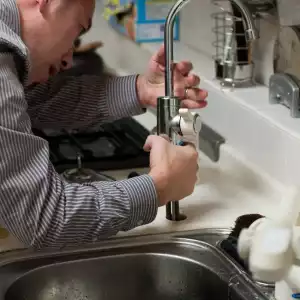Stepping into a cold shower is never fun. When your water heater stops working, you need solutions fast. This comprehensive guide will help you diagnose the problem and determine whether it’s a quick fix or time to call a professional.
Quick Emergency Assessment
Before panicking, check these basics:
- Is the power source (gas or electric) working?
- Has the circuit breaker tripped?
- Is the thermostat setting correct?
- Are there any visible leaks?
- What’s the age of your water heater?
Water Leaks
Water leaks in a tank can originate from various sources, both at the top and bottom. At the top of the tank, issues may arise from input/output connections, faulty temperature and pressure (T&P) valves, or corroded fittings, all of which can lead to significant water loss. Conversely, at the bottom of the tank, it’s crucial to differentiate between condensation and an actual leak, as the latter may signal potential tank failure. Additionally, problems with the drain valve can exacerbate these issues, contributing to water accumulation and further compromising the integrity of the tank. Regular inspection and maintenance are essential to address these concerns effectively.
Water leaks can be quite a hassle, but identifying the source can make all the difference! At the top of the tank, check those input and output connections, as well as the T&P valve—sometimes they can be the culprits behind unwanted drips. Don’t forget to inspect for any corroded fittings that might be silently causing trouble. Now, if you notice moisture at the bottom of the tank, it’s essential to distinguish between condensation and an actual leak; condensation can be harmless, while a true leak might signal tank failure. Also, keep an eye on the drain valve, as it can sometimes lead to frustrating leaks if it’s not functioning properly. By tackling these areas, you can keep your water heater running smoothly and avoid further headaches!
Top of Tank:
Input/output connections
T&P valve issues
Corroded fittings
Bottom of Tank:
Condensation vs. actual leak
Tank failure
Drain valve problems
DIY Troubleshooting Steps
For Electric Water Heaters:
Reset the circuit breaker
Push the reset button
Check both heating elements
Test the thermostat
Flush the tank
For Gas Water Heaters:
Relight pilot light
Clean thermocouple
Check gas supply
Inspect burner assembly
Test temperature settings
When to Call a Professional
Contact a licensed plumber immediately if:
You smell gas
There’s significant leaking
The tank is over 10 years old
Multiple components have failed
You’re not comfortable with DIY repairs
Preventative Maintenance Tips
Annual Maintenance:
Flush the tank
Test pressure relief valve
Check anode rod
Inspect connections
Clean burner assembly
Regular Checks:
Listen for unusual sounds
Look for leaks
Monitor water temperature
Check pressure relief valve
Inspect vent pipe (gas heaters)
Extending Water Heater Life
Best Practices:
Set proper temperature
Install water softener if needed
Maintain clearance around unit
Regular professional inspections
Consider tankless options
Warning Signs of Failure
Age over 10 years
Rusty water
Frequent temperature fluctuations
Metallic taste/smell
Visible rust/corrosion
Emergency Temporary Solutions
While you’re waiting for those repairs to get sorted out, there are some handy emergency solutions to make life a little easier! You can use large pots to boil water for cooking and cleaning, which can be a real lifesaver.
If you have a gym nearby, why not take advantage of their facilities for showers? It’s also a good idea to check in with your neighbors; they might be able to lend a hand or share resources.
For a more immediate fix, look into temporary water heaters that can provide hot water until everything is back to normal. And if you need a break from the chaos at home, researching local hotel rates could give you a comfy spot to relax.
Remember, you’re not alone in this—there are plenty of options to help you through!
While waiting for repairs:
- Use large pots for boiling water
- Consider nearby gym facilities
- Check if neighbors can help
- Look into temporary water heaters
- Research local hotel rates
Upgrade Considerations
When it comes to upgrading your water heater, there are a few key considerations to keep in mind. If your current unit is over 10-12 years old, requiring frequent repairs, or causing your energy bills to soar, it might be time for a change. Additionally, if you notice visible corrosion or feel that your water heater just isn’t meeting your household’s needs, don’t hesitate to explore your options.
Fortunately, there are some fantastic new technologies available today! From tankless water heaters that provide endless hot water to hybrid heat pump models and even solar water heating systems, you can find an option that suits both your lifestyle and budget. Plus, smart water heaters and high-efficiency units can help you save even more on those pesky energy bills while offering modern conveniences. So why not consider an upgrade? You’ll be glad you did!
When to Replace:
- Age exceeds 10-12 years
- Frequent repairs needed
- High energy bills
- Inadequate capacity
- Visible corrosion
New Technology Options:
- Tankless water heaters
- Hybrid heat pump models
- Solar water heating
- Smart water heaters
- High-efficiency units
[Call to Action]
Don’t suffer through another cold shower! Call [Company Name] at (XXX) XXX-XXXX for 24/7 water heater repair and replacement services.
Our Water Heater Services:
- Emergency repairs
- New installations
- Preventative maintenance
- Energy efficiency upgrades
- Water heater inspections
[Trust Building Close]
Our licensed plumbers have decades of experience with all water heater brands and types. We serve [City] with fast, reliable service when you need it most.
[Emergency Contact]
24/7 Hot Water Emergency Services
Call (XXX) XXX-XXXX
Intro
Did you know that nearly 75% of homeowners will experience water heater problems at some point? If you’re suddenly left with no hot water, the panic can set in quickly. But fear not! This emergency survival guide will walk you through essential steps for effective water heater repair, ensuring you regain your comfort in no time. By the end of this article, you’ll be equipped with practical solutions and tips to tackle any water heater issue that arises.
Imagine stepping into a shower only to be greeted by icy water—it’s a nightmare many homeowners face when their water heater malfunctions. Understanding how to handle these situations is crucial, especially when you find yourself dealing with unexpected water heater problems. In this emergency survival guide, we’ll provide you with actionable insights on water heater repair that can save you from cold showers and frustration. Get ready to learn how to troubleshoot effectively and restore your hot water supply!
Have you ever considered how much we rely on our hot water heaters until they stop working? When faced with the frustration of no hot water, it’s easy to feel overwhelmed by the prospect of water heater repair. This article serves as your emergency survival guide, offering practical advice and troubleshooting tips for common water heater problems. You’ll discover everything you need to know to regain control over your hot water situation and avoid costly repairs down the line.
Conclusions
In conclusion, a malfunctioning hot water heater can disrupt your daily routine, but with the right knowledge and tools, you can tackle the issue head-on. By following the steps outlined in this guide, you’ll be better equipped to identify the root cause of the problem and decide whether it requires a simple DIY fix or the expertise of a professional. Remember that regular maintenance can prevent these emergencies from occurring in the first place. Don’t let a cold shower ruin your day—take proactive measures to ensure your hot water heater runs smoothly. If you’re ever in doubt, don’t hesitate to reach out to a qualified technician for assistance.
To wrap up, dealing with a hot water heater that’s on the fritz can be daunting, but you now have a solid emergency survival guide at your fingertips. Armed with the troubleshooting tips provided here, you can quickly assess the situation and take appropriate action. Whether it’s tightening loose connections or recognizing when it’s time to call in an expert, being informed can save you time and frustration. Furthermore, consider scheduling regular check-ups to keep your system running efficiently and minimize future breakdowns. Don’t let unexpected cold showers catch you off guard—stay prepared and maintain your comfort!



